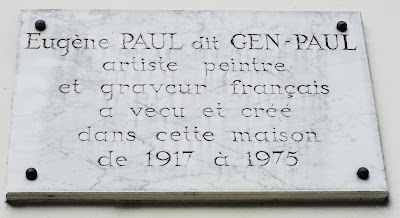Gen Paul (1895—1975) has a place in literary history not for writing but for featuring in the works of two writers: very briefly in Marcel Aymé's short story 'Le Passe-Muraille' ('The Man Who Walked through Walls') (1943), and as an important character in his friend Louis-Ferdinand Céline's novel Féerie pour une autre fois (Fable for Another Time) (1952).
Gen Paul was born in rue Lepic, Montmartre, and lost a leg in World War II. While convalescing he took up again the painting that had been his hobby as a child, his expressionistic ideas being influenced by many different artistic sources. He was to make his living as a painter for the rest of his life.
Gen Paul's home and workplace at 2 avenue Junot, Montmartre.
Unless you actually knew, it would be impossible to tell that this is Gen Paul's grave, as no matter where you look there's no indication of it, no inscription at all.
Gen Paul was born in rue Lepic, Montmartre, and lost a leg in World War II. While convalescing he took up again the painting that had been his hobby as a child, his expressionistic ideas being influenced by many different artistic sources. He was to make his living as a painter for the rest of his life.
Gen Paul's home and workplace at 2 avenue Junot, Montmartre.
'Eugéne PAUL dit GEN-PAUL
artiste peintre
et graveur français
a vécu et créé
dans cette maison
de 1917 à 1975'
'Eugéne PAUL known as GEN-PAUL
artist painter
and French engraver
lived and created
in this house
from 1917 to 1975'
Unless you actually knew, it would be impossible to tell that this is Gen Paul's grave, as no matter where you look there's no indication of it, no inscription at all.








No comments:
Post a Comment